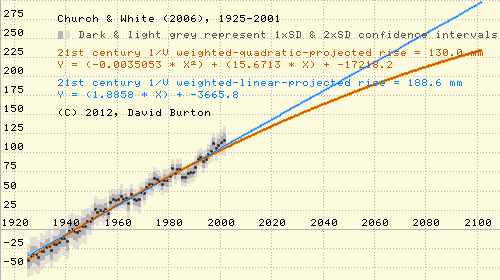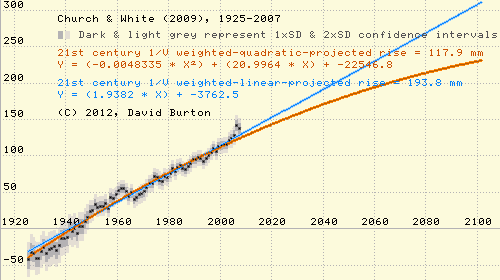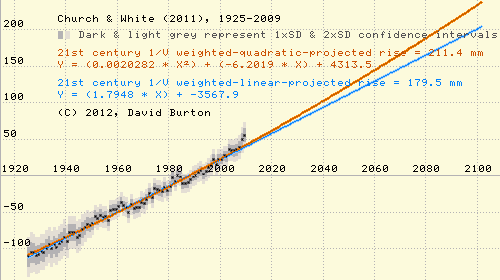Sea level errors:
Replies to “SeaMonster” blogger John Bruno
by Dave Burton
This web page is a reaction to my frustration with the “SeaMonster” blog's misinformation and stifling of substantive debate about sea level rise. -DAB
Table of Contents:
- Reply to UNC Biology Dept. Prof. John Bruno's “Sea Level Rise 101” 6/16/2012
- Prof. Bruno's definition of “non censoring” 6/18/2012
- Prof. Bruno's confused rebuttal (with blog comments disabled) 6/19/2012
1. Reply to Prof. John Bruno's “Sea Level Rise 101” blog article
This is my reply to a pair of blog articles
([1]
&
[2])
by "seamonster" blogger & UNC Biology Dept. Professor John Bruno, which are highly critical
of NC HB 819 and
it's supporters. -Dave Burton
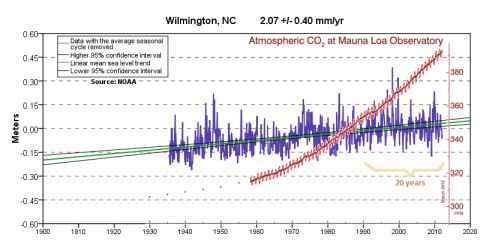
Juxtaposition of rising CO2 levels (in red) with sea level (in purple) at Wilmington.
Sea level has obviously been unaffected by CO2. (Click graph for a larger version.)
June 16, 2012
Prof. Bruno, I posted the following point-by-point reply to your "sea level rise 101" blog post more than two days ago, but it still hasn't appeared on your blog. Are you censoring your blog, to prevent disagreement with you, or are you just on vacation?
The six "claims" below are quoted from your previous blog post.
BTW, here's one more reference that I should have included in that
reply, regarding the folly of relying on Rahmstorf & Vermeer's sea level
prediction methods:
http://tinyurl.com/HnD2VnR
Dave
There certainly is a lot of confusion about sea level rise, but it's
the Climate Movement activists, not the supporters of the bill, who are
confused. The purpose of the bill is to require that regulatory policy
conform to actual scientific data, rather than activists' political
agendas.
1. Claim: "These rapid increases in sea level are - as you might have guessed - caused by the rapid melting of glaciers."
Wrong. The big rise in sea level in prehistoric times was due to the melting of enormous ice sheets which covered much of the globe, as far south as today's New York City. It was not due to the tiny changes in advance and retreat of glaciers that we see these days.
There are only two places left where there are really large amounts of water locked up in grounded ice: Antarctica and Greenland. Neither will melt anytime soon.
Even the alarmist IPCC's TAR noted, "It is now widely agreed that major loss of grounded ice and accelerated sea level rise [from the West Antarctic Ice Sheet] are very unlikely during the 21st century." (The larger East Antarctic Ice Sheet is the coldest place on earth, and hasn't melted in millions of years.)
Nor is Greenland a cause for worry. Greenland is colder now than it
was in the 1930s and 1940s, and much colder than during the Medieval Warm
Period (~800-1100 yrs ago), neither of which saw catastrophic sea level
rise from any Greenland ice sheet "tipping point."
2. Claim: "Greenhouse gas emissions are causing sea level to rise via "thermal expansion" (warming a liquid increases it's volume) and by melting mountain glaciers. Until human activities increased the concentration of greenhouse gases in the earth's atmosphere, global sea level had been relatively stable for several thousand years..."
Wrong. Although the average rate of sea level rise increased as the Little Ice Age ended, ALL of the acceleration in rate of sea level rise occurred BEFORE there was a substantial anthropogenic CO2 contribution. The big increase in atmospheric CO2 levels over the last 3/4 century has not resulted in ANY acceleration in the rate of sea level rise.
The TAR noted the "observational finding of no acceleration in sea level rise during the 20th century."
If you chart sea levels from coastal tide gauge data until 18 years ago, but then switch to using satellite data, you'll create an illusion of acceleration for the last 18 years.
Moreover, although thermal expansion does cause satellite-measured
mid-ocean sea level to rise, it does not necessarily cause coastal sea
level to rise. If deep-ocean water were to expand, it would, indeed,
affect coastal sea levels. But when surface water warms, it rises in
place, like ice, and its displacement is unaffected, so it does not affect
coastal sea levels.
3. Claim: "The rate of sea level rise appears to be accelerating"
Wrong. Both tide gauges records and satellites show NO statistically significant acceleration over the last 3/4 century. The best studies show either linear trend or a slight deceleration.
Church & White (2006) claimed to have measured a slight "20th century acceleration in global sea-level rise." But they admitted "no 20th century acceleration has previously been detected" by other researchers, and ALL of the acceleration they detected was before 1925 -- i.e., before there was much anthropogenic CO2 in the atmosphere.
In 2009, they posted updated data to their web site. I applied their regression analysis method to the new data (minimum-variance unbiased estimator quadratic fit). Result: DECELERATION.
I told Drs. Church & White about it. Dr. Church replied (June 18, 2010):
"...thank you ... For the 1901 to 2007 period, again we agree with your result and get a non-significant and small deceleration."
In fact, though the deceleration for the 1901-2007 period was slight, in both datasets the deceleration since 1925 was much more noticeable.
In 2011, Church and White released a third data set. This one shows a
very slight acceleration in sea level rise after 1925, though much smaller
in magnitude than the deceleration seen in their other data sets. The
post-1925 acceleration in this data set, if it continued to 2080, would
add just 0.8 inches of sea level rise, compared to a linear projection.
See the last three graphs here:
http://www.burtonsys.com/climate/jnathaz1/
4. Claim: "There is a lot of variation in the rate of sea level rise."
Right! In fact, at about 1/4 of the GLOSS-LTT tide gauges, sea level
is FALLING, rather than rising.
5a. Claim: "How much sea level rise should we expect this century? ... Observed sea level rise is tracking at the upper range of model predictions..."
Wrong. Your fig. 6 conflates tide gauge and satellite measurements, creating the ILLUSION of acceleration where none actually exists. If you measure sea level trends at two different locations, you'll generally get two different results (as inferred by your claim #4). If you switch from one to the other, you can create the illusion of either acceleration or deceleration. (Don't feel too bad. The IPCC made the same blunder, and still got a Nobel Prize.)
Additionally, a graph of just 40 years is insufficient to discern long
term trends, because there are cyclical forces at work on the order of 60
years. Douglas (1995) concluded that 50 years is a bare minimum;
Jevrejeva et al (2008), Klyashtorin, L. (2001), and Scafetta say 60 years.
Believe it or not, even the severely flawed 2010 CRC Science Panel report
admitted (p.6) that,
"tide gauges [which] don't extend back in time more than 50 years [make]
it difficult to resolve changes in the rate of rise over the decades"
(though they then went on to use a 24 year record in preference to an
available 75 year record)
5b. Claim: "An alternative way to predict future sea level rise is from the known relationship between sea level and global temperature from the recent and distant past (Vermeer 2009)..."
Wrong. The Rahmstorf/Vermeer approach has been thoroughly discredited, and that Fig. 7 graph is nonsense. If you look at real tide gauge data from the best tide gauges, it looks nothing at all like that. E.g.,
Honolulu:
http://tidesandcurrents.noaa.gov/sltrends/sltrends_station.shtml?stnid=1612340
Warnemunde:
http://tidesandcurrents.noaa.gov/sltrends/sltrends_global_station.shtml?stnid=120-012
Tom Moriarty has done a particularly comprehensive job of demolishing that nonsense:
http://climatesanity.wordpress.com
The bottom line is simply this: mankind has been driving up CO2 levels substantially for about 3/4 century, and the result has been no increase at all in the rate of sea level rise. This bill simply requires that before regulations are promulgated which would cost coastal communities billions of dollars, there should be scientific data which justifies them.
Dave Burton
member, NC Sea Level Rise Impact Study Advisory Committee
IPCC AR5 WG1 Expert Reviewer
NC-20 Science Advisor

P.S. -- I've emailed Prof. Bruno several times, thus far without result.
Almost immediately after I sent the following email, CC-ing
eight of Prof. Bruno's colleagues, he replied, pledging that he does not censor
polite dissenting views on the SeaMaster blog. He also "approved" the 2nd of my two
(very similar) blog comments (about three days after I had posted the 1st one).
He still hasn't approved the 1st one (which was a comment on the other article).
-DB 6/17/2012
Date: Sun, 17 Jun 2012 17:14:31 -0400 Subject: Re: NC SLR From: David Burton To: "John Droz, jr." Cc: John Bruno, John Bruno, Emmett Duffy, Helen Scales, Zena Cardman, Steven Gaines, Kerry Tremain, Bruce Caron, Steve Miller, Kat Grigg Dear John D., It appears that we wasted our time responding to Prof. Bruno. Several days have gone by, and he's neither replied to any of my emails nor permitted either of my two comments to appear on his seamonster blog. Yet he did find time to post a new story there early this morning, so he's obviously not off on vacation. It's too bad that the seamonster blog apparently does not permit disagreement in the comments on their articles. For what it's worth, I've put my rejected blog comment on a web page here: http://tinyurl.com/6vtygz9 I've cc'd this email to Prof. Bruno (at both of his email addresses), and to the other people associated with seamonster, in the hope that one or more of them might be uncomfortable with such censorship. Warmest regards, Dave On Sun, Jun 17, 2012 at 9:18 AM, David Burton wrote: > Prof. Bruno, > > I see that you have posted a new article on the blog this morning, but you > still haven't approved either of my comments. Obviously you are not on > vacation. So it appears safe to conclude that you're censoring viewpoints > that differ from your own. > > How disappointing. > > Dave > > > On Sun, Jun 17, 2012 at 12:11 AM, David Burton wrote: > >> Perhaps my previous emails haven't reached you; I'm trying again, this >> time with your UNC address. >> >> Dave >> >> >> On Sat, Jun 16, 2012 at 11:55 PM, David Burton wrote: >> >>> Prof. Bruno, >>> >>> After more than two days, my comment still hasn't appeared on your >>> blog. So I've tried to post a comment to your newer >>> "The NC sea level rise saga: mid-week update" blog post. >>> >>> Also, I must say that I found your nasty ad hominem attack on >>> physicist John Droz to be in extremely poor taste. John is a friend >>> of mine, and a careful thinker, whose background qualifies him very well >>> to understand the mechanics of sea level rise. He has very generously >>> volunteered his time as one of the Science Advisers to NC-20, and countless >>> hours in service to the community, entirely without pay. He does not >>> deserve such treatment. >>> >>> Will you please approve my blog comments, so that your readers can see >>> both sides of the argument, and judge for themselves which is more nearly >>> correct? >>> >>> Dave >>> >>> >>>>On Fri, Jun 15, 2012 at 9:24 PM, David Burton wrote: >>>> >>>>> Prof. Bruno, >>>>> >>>>> Did you receive this? >>>>> >>>>> My comment still hasn't appeared on your blog. >>>>> >>>>> Dave >>>>> >>>>> >>>>> On Thu, Jun 14, 2012 at 11:48 PM, David Burton wrote: >>>>> >>>>>> Dear Prof. Bruno, >>>>>> >>>>>> John D. forwarded this to me, and I posted a detailed response to your blog >>>>>> page http://theseamonster.net/2012/06/sea-level-rise-101/, around 7:30 >>>>>> or 8 p.m. today. It has not appeared yet, so I guess it's in a moderation >>>>>> queue. If it has gotten lost, let me know, and I'll repost it. >>>>>> >>>>>> Warmest regards, >>>>>> Dave ...[snip]
2. “non censoring,” as defined by a UNC Biology Professor and “SeaMonster” blogger John Bruno
38 minutes after I sent that email to Prof. Bruno, CC-ing eight of his colleagues, he emailed me to pledge that he does not censor dissenting views on the SeaMonster blog:
On Sun, Jun 17, 2012 at 5:52 PM, John Bruno wrote:
> Dear Dave, we are non censoring you. ...
and:
On Sun, Jun 17, 2012 at 7:11 PM, John Bruno wrote:
> Dear Dave,
>
> ... To be clear, we certainly accept comments with opinions that don't
> agree with our own. But be prepared to have your claims fact checked.
> Also, stay well clear of personal attacks, don't question the motives of
> others, etc. In general, be a gentlemen and you will be welcome. ...
>
> Sincerely,
>
> John
Unfortunately, Prof. Bruno's commitment to open discussion and debate lasted just under 21 hours. I attempted to politely address one of his points in more detail, and emailed him, asking him to approve the comment. This was his reply:
On Mon, Jun 18, 2012 at 2:49 PM, John Bruno wrote:
> Dear Dave, I saw your new comment and I am not going to accept it.
>
> John
>
>
> On Monday, June 18, 2012 at 7:08 AM, David Burton wrote:
>
> > Please "approve" my [new] comment!
> >
> > Thanks,
> > Dave
I emailed back and asked him why, but he did not reply. (Instead, he posted a rebuttal article entitled, "The NC sea level rise saga: reply to Dave Burton" -- with no comments permitted.)
This is the comment which he rejected (with a few minor syntax improvements):
Let's concentrate on what is arguably the most important mistake in your article, John:
3. Claim: "The rate of sea level rise appears to be accelerating"
Wrong. Both tide gauge records and satellites show no statistically significant acceleration over the last 3/4 century. The best studies show either linear trend or a slight deceleration.
Here in North Carolina, our best sea level data is from the 77-year tide station record at Wilmington. It's the only GLOSS-LTT tide gauge in the State. Here are a pair of NOAA graphs, combined into one, so you can see how CO2 has not affected sea level. Note how CO2 levels (in red) have been rising substantially for ~ 3/4 century, yet sea level (in purple) at Wilmington has been unaffected:

Sea level at Wilmington has obviously been unaffected by CO2
(Click graph for a larger version.)
Houston & Dean did both a thorough analysis of tide station data and a comprehensive literature search. The result:
“The results of all of our analyses are consistent - there is no indication of an overall world-wide sea level acceleration in the 20th Century data. Rather, it appears that a weak deceleration was present.”
Satellite altimeters measure a very different quantity than tide gauges (which is why it is a severe error to conflate the two!), and there are severe problems with the satellite data, and there's only 19 years of it (nowhere near enough to calculate a robust trend), but it is nevertheless worth noting that the satellites, too, show a noticeable deceleration in the rate of sea level rise, as you can see in this graph (from Aviso):
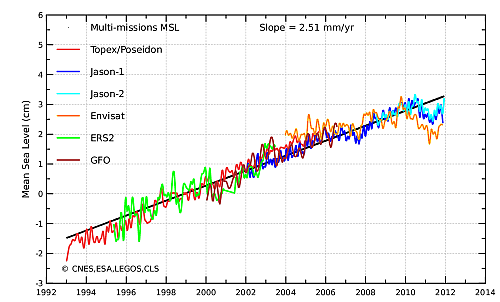
(Click on the graph for a larger version.)
CO2 is up. Temperatures are up a bit, too, at least compared to the chilly 1960s and 1970s. Yet the rate of sea level rise hasn't increased (accelerated) at all.
Church & White (2006) claimed to have measured a slight "20th century acceleration in global sea-level rise." But they admitted "no 20th century acceleration has previously been detected" by other researchers, and I found that all of the acceleration they detected was before 1925 -- i.e., before there was much anthropogenic CO2 in the atmosphere.
In 2009, they posted updated data to their web site. I applied their regression analysis method to the new data (minimum-variance unbiased estimator quadratic fit). Result: Deceleration.
I told Drs. Church & White about it. Dr. Church replied (June 18, 2010):
"...thank you ... For the 1901 to 2007 period, again we agree with your result and get a non-significant and small deceleration."
In fact, though the deceleration for the full 1901-2007 period was slight, in both datasets the deceleration since 1925 was much more noticeable, as you can see in these two graphs:
In 2011, Church and White released a third data set. This one shows a very slight acceleration in sea level rise after 1925, though much smaller in magnitude than the deceleration seen in their other data sets. The post-1925 acceleration in this data set, if it continued to 2080, would add just 0.8 inches of sea level rise, compared to a linear projection, as you can see here:
The bottom line is simply this: mankind has been driving up CO2 levels substantially for about 3/4 century, and the result has been no increase at all in the rate of sea level rise.
The purpose of the NC's HB 819 is to require that regulatory policy conform to actual scientific data, rather than activists' political agendas. It simply requires that before regulations are promulgated which would cost coastal communities billions of dollars, there should be scientific data which justifies them.
That is so obviously the right thing to do that HB 819 passed the NC Senate with a nearly 3-to-1 bipartisan majority.
You should support it, too. Everyone who believes that public policy regarding sea level should be driven by geophysical science rather than political science should support this bill.
Dave Burton
NC-20 Science Advisor (one of them)
Member, North Carolina Sea Level Rise Impact Study Advisory Committee
IPCC AR5 WG1 FOD Expert Reviewer
http://www.burtonsys.com/email/
3. Reply to Prof. John Bruno's “The NC sea level rise saga: reply to Dave Burton” blog article
Prof. Bruno then posted a new blog article entitled, "The NC sea level rise saga: reply to Dave Burton." However, he doesn't want any replies to his "reply to Dave Burton," so he disabled comments.
His article purports to correct "the junk science being created and promoted by climate change deniers like Dave Burton and John Droz, Jr." However, it contains several glaring errors.
(Also, note the irony of such name-calling, just one day after Prof. Bruno
declared that the rules of conduct for his blog were to "stay well clear
of personal attacks, don't question the motives of others, etc. In general,
be a gentlemen and you will be welcome.")
Error #1: it is apparent that Prof. Bruno is confused about the difference between rate and acceleration.
The rate of sea level rise is the first derivative of sea level, acceleration is the second derivative. What that NOAA graph shows is that the rate of sea level rise at Wilmington is positive, but declining: 2.0 mm/year averaged over the full 77 year record, but 0.0 mm/year averaged over the last 20 years. That decline in rate means that sea level rise at Wilmington has decelerated. I.e., the acceleration is negative.
The rate of sea level rise at Wilmington (at least when averaged over the full record) is positive, but the acceleration is negative. (Note that not all tide gauges show such deceleration, but the best studies of sea level from multiple tide gauges find either a linear trend or a slight deceleration.)
Note that in that Table 1 (which Prof. Bruno copied from the CRC's 2010 Report), the rate of sea level rise at Wilmington for 1935-2002 is given as 2.12 mm/year. But now NOAA calculates it as only 1.98 mm/year for 1935-2011. The decline reflects the slight deceleration in sea level rise at Wilmington.
2.0 mm/year over 88 years is less than 7 inches -- hardly noticeable. But the CRC's 2010 Report absurdly projects an average rate of over 11 mm/year, totalling 39" in 88 years -- a dramatic acceleration, even though no acceleration at all is in evidence.
That's why the record of measured sea level, as shown in NOAA's graph,
is inconsistent with projections of wildly accelerated sea level rise.
Error #2: Prof. Bruno says, "Dave seems to mistakingly think that only an acceleration of sea level rise could be evidence of a human cause. Not true. Scientists know that current global sea level rise (not an acceleration in it) itself is caused by global warming."
That's absurd. The fact that the current rate of global sea level rise
predates any substantial anthropogenic GHG contribution is proof that it
could not have been caused by anthropogenic GHG emissions. Isn't it
obvious that anthropogenic GHGs can't travel back in time and affect
the climate before they're emitted? Why is this hard to understand?
Error #3: Prof. Bruno does not understand Archimedes' Principle.
I wrote:
"Although thermal expansion does cause satellite-measured mid-ocean sea level to rise, it does not necessarily cause coastal sea level to rise. If deep-ocean water were to expand, it would, indeed, affect coastal sea levels. But when surface water warms, it rises in place, like ice, and its displacement is unaffected, so it does not affect coastal sea levels."
To this, Prof. Bruno replied, "I probably don't need to point out the flaw in this crazy logic to many SeaMonster readers."
Physics often sounds like "crazy logic" to people who don't understand it. Prof. Bruno is a biologist, but perhaps he can get someone in the UNC Physics Dept. to explain it to him.
Don't feel too bad, Prof. Bruno. Many people find Archimedes' Principle confusing. In fact even the National Science Foundation has trouble with it! Believe it or not, they had a related but even more obvious error prominently featured on their web site for over 6.5 years! (I wrote to them about it, and they removed it, but it was the source of some hilarity at WUWT.)
Permalink: http://tinyurl.com/6vtygz9
